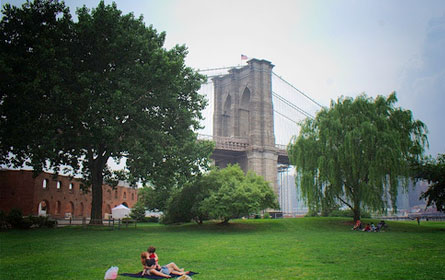
In a rare move, the City Council overrode the objections of a local council member, approving a 325-unit mixed-use development project in Dumbo.
Councilmember David Yassky opposes the project, known as Dock Street Dumbo, because, he says, it will permanently taint the view of the Brooklyn Bridge.
"New Yorkers, tourists but principally New Yorkers, enjoy a walk or drive or bicycle over the Brooklyn Bridge," said Yassky. "It would be a mistake to tamper with this in any way."
The development, which was approved by a vote of 40 to 9, is adjacent to the landmark and, at its tallest point, would rise to 17 stories.
Dock Street
Opponents of the project include not only those whose views would be blocked by the towering residences, Yassky said, but also people from across the country who consider any development near the structure an interference with a historical landmark.
As selling points, 20 percent of the apartments in the project will be permanently affordable, and it includes space for a new middle school. The developers have promised to contribute to the cost of the school, said council officials.
Councilmember Letitia James, who represents part of the neighborhood but not the project area specifically, supports the proposal. The project, she says, does not pose any threat to the bridge.
"It holds the promise of hundreds of new middle school seats for public school children in downtown Brooklyn," said James. "It will also create Dumbo's first, first ever, affordable housing."
The section closest to the bridge will be 75 feet tall, while its highest point will be 17 stories. The developer, Two Trees Management, first proposed the project in 2004 but has revised the proposal to address community concerns.
The community board voted in favor of the project.
Rarely does the City Council vote against a land use proposal that the local councilmember opposes. Council Speaker Christine Quinn, who controls the agenda at the council, said after touring the area with both sides, she weighed the options and chose to support Dock Street Dumbo.
"We try as much as we can on local zoning matters or land use matters to be as respectful as we can of the individual member's perspective and prerogative," said Quinn. "Sometimes, though, you end up with a different opinion."
During the debate, council members have alleged that the city's School Construction Authority had no intention of building more schools in the Downtown Brooklyn area, but chose to support the proposal as a favor to the developer. The school was a linchpin in the development's approval.
Quinn denied the project had any inappropriate dealings attached to it.
Abatement Bills
The council also approved several bills, announced last month, further regulating the city's construction agency and their abatement procedures for reducing asbestos and other hazards at construction sites.
The five bills unanimously approved by the City Council are part of a legislative package proposed in response to the fire at the Deutsche Bank building almost two years ago. The fire killed firefighters Joseph Graffagnino and Robert Beddia, who were trapped inside. The building, which had been severely damaged and contaminated in the Sept. 11 attacks, was being deconstructed. The abatement and demolition process created maze-like conditions, making it difficult to fight the blaze.
The first bill (Intro 1003) will create a permit process for abatement jobs that are particularly high risk, said city officials. It will also require the use of fire retardant materials for any abatement process, and give authority to inspectors from the Department of Environmental Protection to enforce provisions of the fire and building code.
In addition to the abatement bills, the council approved legislation (Intro 1001 ) that prohibits smoking and bans the possession of tobacco, matches, and lighters on any asbestos abatement site. Another bill (Intro 1002 ) would permanently include the construction site smoking ban in the building code, which city officials said would make it easier to enforce. Smoking is believed to have started the Deutsche Bank fire.
As part of the package, the council also passed legislation ( Intro 1005) requiring the Department of Environmental Protection, the Fire Department and the Buildings Department draft rules on how to maintain accessible exits during a building's abatement.
Legislation (Intro 1007) was also approved that would require those departments enhance intra-agency notification when violations are issued by another department. Currently, said council officials, inspectors from their respective departments enter a site not knowing what violations have been issued by another department. Increasing communication, they say, will increase safety.
The total package includes a dozen bills, which Quinn said the council will consider throughout the summer. Most of the requirements have already been implemented, officials said. But, they add, approving them at the council will ensure they are a permanent part of the city's code.
Fines at Natural Districts
The council also approved legislation (Intro 927), which increases fines for the removal of trees in the city's four natural district areas. These districts, two on Staten Island, one in the Bronx and one in Queens, provide protection for an area's natural features, such as wetlands, forests or rock outcroppings, according to the council.
Under the bill, penalties would increase from a maximum of $500 to a range of $750 to $10,000.